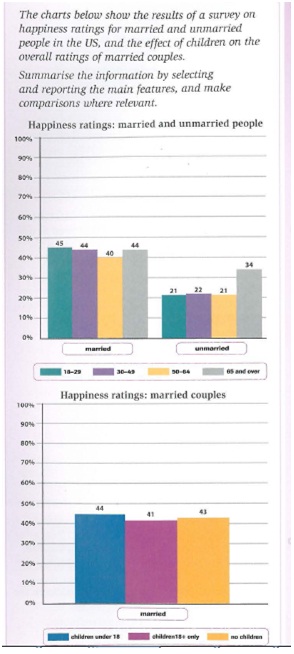The charts below show the results of a survey on happiness ratings for married and unmarried people in the US, and the effect of children on the overal ratings of married couples.
A breakdown of percentage of the survey on happiness ratings between married and unmarried people in four different age groups and the effect of children in a married couples is illustrated in the bar graphs. Overall, the most obvious piece of information is that the most happiness trend is experienced by the married couples. While the highest percentage is hold by 18-29 age group, having children under 18 is the most influencing happiness in a family.
Standing at 45%, the age group 18-29 of married couples is the highest group feeling happiness. Both groups aged 30-49 and 50-64 said that they felt happy after getting married and the data shows balance percentage in 44% followed by survey on people aged 65 over, 40% of them said that they are happy. Compare to unmarriage people groups, the result of the survey explains that 21-22% percent people aged under 65 feeling happiness. Interestingly, the percentage increases dramatically when the survey was conducted to people aged 65 and over, which rose by 34%.
A more detailed analysis shows that 44% happiness in a family is influenced by having children under 18. However, the survey results that the happiness decreases when children have been growing up to aged more than 18. Uniquely, 43% couples said that they are happy even though they have no children.
A breakdown of percentage of the survey on happiness ratings between married and unmarried people in four different age groups and the effect of children in a married couples is illustrated in the bar graphs. Overall, the most obvious piece of information is that the most happiness trend is experienced by the married couples. While the highest percentage is hold by 18-29 age group, having children under 18 is the most influencing happiness in a family.
Standing at 45%, the age group 18-29 of married couples is the highest group feeling happiness. Both groups aged 30-49 and 50-64 said that they felt happy after getting married and the data shows balance percentage in 44% followed by survey on people aged 65 over, 40% of them said that they are happy. Compare to unmarriage people groups, the result of the survey explains that 21-22% percent people aged under 65 feeling happiness. Interestingly, the percentage increases dramatically when the survey was conducted to people aged 65 and over, which rose by 34%.
A more detailed analysis shows that 44% happiness in a family is influenced by having children under 18. However, the survey results that the happiness decreases when children have been growing up to aged more than 18. Uniquely, 43% couples said that they are happy even though they have no children.

happiness_in_family..jpg
